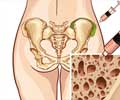Senolytic drugs may help rejuvenate older organs, which could lead to better outcomes and a wider pool of organs eligible for donation, said researchers.

‘Anti-aging drugs may revitalize organs from older, deceased donors, with the potential to improve outcomes and transplant availability. ’





Older organs can also often provoke a stronger immune response and may put patients at greater risk of adverse outcomes and transplant rejection. But, as the world population ages, organs from older, deceased donors represent an untapped and growing resource for patients in need. "Older organs are available and have the potential to contribute to mitigating the current demand for organ transplantation," said corresponding author Stefan G. Tullius, MD, PhD, chief of the Division of Transplant Surgery at the Brigham. "If we can utilize older organs in a safe way with outcomes that are comparable, we will take a substantial step forward for helping patients."
As organs age, senescent cells accumulate. These cells, which no longer divide, escape the body's usual means of destroying older, unneeded cells. Senescent cells release cell-free mitochondrial DNA (mt-DNA), which also accumulates in older organs. Recent studies have suggested that this rise in mt-DNA is tied to organ rejection.
In their Nature Communications paper, Tullius and colleagues identified senescent cells as the key source of mt-DNA and present evidence that the accumulation of mt-DNA provokes an immune response leading to organ failure and rejection. Senolytic drugs force senescent cells back into the cell cycle, allowing the body to clear them.
The researchers therefore examined whether senolytic drugs could be used to improve outcomes. In a mouse model, they treated organ donors with a combination of the senolytic drugs dasatinib and quercetin. The drugs reduced the number of senescent cells, reduced mt-DNA levels and decreased inflammation. Most relevantly, the survival of old organs treated with senolytics was as comparable to that of organs originating from young donors.
Advertisement
"We have not yet tested the effects clinically, but we are well prepared to take the next step toward clinical application by using a perfusion device to flow senolytic drugs over organs and measure whether or not there are improvements in levels of senescent cells," said Tullius. "Our data provide a rationale for considering clinical trials treating donors, organs, and/or recipients with senolytic drugs to optimize the use of organs from older donors. The goal is to help to close the gap between organ availability and the needs of the many patients currently on transplant waiting lists."
Advertisement













